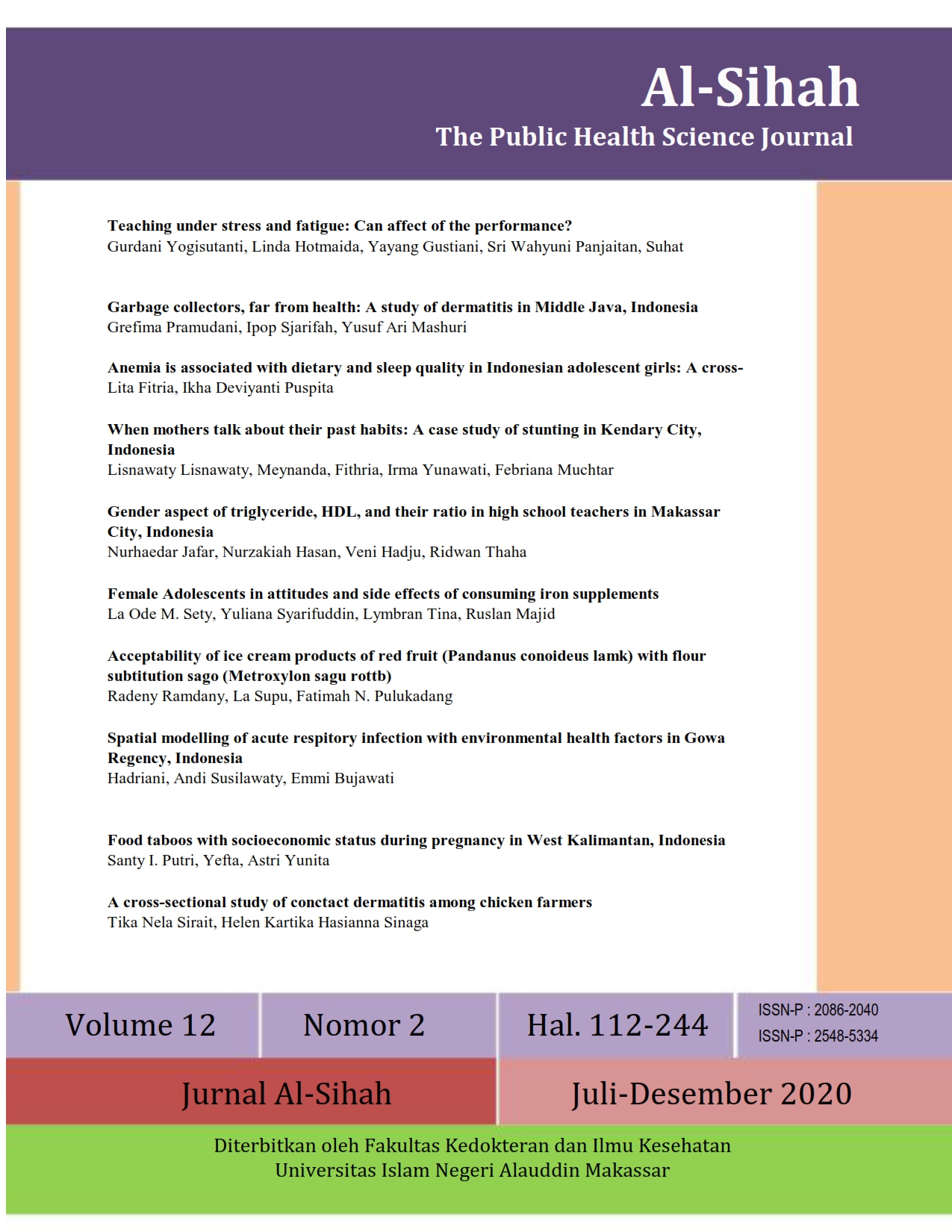Food taboos with socioeconomic status during pregnancy in West Kalimantan, Indonesia
Abstract
Each region in Indonesia has diversity in terms of food consumption patterns, especially for pregnant women, which is accompanied by beliefs about taboos from certain types of food. This study aimed to determine the relationship between age, education level, employment status, and the culture of food taboos in pregnant women. This was an observational analytic study with a cross-sectional approach. The study was conducted in the working area of the Bengkayang Health Center, West Kalimantan, Indonesia. A sample of 30 pregnant women selected by purposive sampling. The dependent variable is the culture of food taboos in pregnancy. The independent variables include age, education, and employment status. The data were collected by a questionnaire and analyzed using multiple linear regression. Education (b = 0.48; 95% CI = 0.10 to 0.85; p = 0.015) and employment status (b = 0.51; 95% CI = 0.19 to 0.84; p = 0.003) had a relationship with the culture of food taboos in pregnancy and were statistically significant. This study also found a relationship between education and employment status with the culture of food taboos in pregnancy.
Downloads
References
Agus, Y., Horiuchi, S., & Porter, S. E. (2012). Rural Indonesia women’s traditional beliefs about antenatal care. BMC Research Notes, 5(1), 1. https://doi.org/10.1186/1756-0500-5-589
Arzoaquoi, S. K., Essuman, E. E., Gbagbo, F. Y., Tenkorang, E. Y., Soyiri, I., & Laar, A. K. (2015). Motivations for food prohibitions during pregnancy and their enforcement mechanisms in a rural Ghanaian district. Journal of Ethnobiology and Ethnomedicine, 11(1), 1–9. https://doi.org/10.1186/s13002-015-0044-0
Chakona, G., & Shackleton, C. (2019). Food Taboos and Cultural Beliefs Influence Food Choice and Dietary Preferences among Pregnant. Nutrients, 11, 1–18.
Ekwochi, U., Osuorah, C. D. I., Ndu, I. K., Ifediora, C., Asinobi, I. N., & Eke, C. B. (2016). Food taboos and myths in South Eastern Nigeria: The belief and practice of mothers in the region. Journal of Ethnobiology and Ethnomedicine, 12(1), 1–6. https://doi.org/10.1186/s13002-016-0079-x
Kariuki, L. W., Lambert, C., Purwestri, R. C., Maundu, P., & Biesalski, H. K. (2017). Role of food taboos in energy, macro and micronutrient intake of pregnant women in western Kenya. Nutrition and Food Science, 47(6), 795–807. https://doi.org/10.1108/NFS-09-2016-0146
Martínez Pérez, G., & Pascual García, A. (2013). Nutritional Taboos among the Fullas in Upper River Region, The Gambia. Journal of Anthropology, 2013, 1–9. https://doi.org/10.1155/2013/873612
Meyer-Rochow, V. B. (2009). Food taboos: Their origins and purposes. Journal of Ethnobiology and Ethnomedicine, 5, 1–10. https://doi.org/10.1186/1746-4269-5-18
Paath E, R. Y. dan H. (2005). Gizi dalam Kesehatan Reproduksi. Jakarta: EGC.
Raj, D., Id, S., Ghimire, S., Upadhayay, S. R., & Singh, S. (2020). Food insecurity and dietary diversity among lactating mothers in the urban municipality in the mountains of Nepal. 1–17.
Rosen, J. G., Clermont, A., Kodish, S. R., Matar Seck, A., Salifou, A., Grais, R. F., & Isanaka, S. (2018). Determinants of dietary practices during pregnancy: A longitudinal qualitative study in Niger. Maternal and Child Nutrition, 14(4), 1–10. https://doi.org/10.1111/mcn.12629
Suchdev, P. S., Peña-Rosas, J. P., & De-Regil, L. M. (2014). Multiple micronutrient powders for home (point-of-use) fortification of foods in pregnant women. Cochrane Database of Systematic Reviews, 2014(6). https://doi.org/10.1002/14651858.CD011158
Thornton, L. E., Lamb, K. E., & Ball, K. (2013). Health & Place Employment status , residential and workplace food environments : Associations with women ’ s eating behaviours. Health & Place, 24, 80–89. https://doi.org/10.1016/j.healthplace.2013.08.006
Ugwa, E. (2016). Nutritional Practices and Taboos Among Pregnant Women Attending Antenatal Care at General Hospital in Kano, Northwest Nigeria. Annals of Medical and Health Sciences Research, 6(2), 109–114. https://doi.org/10.4103/2141-9248.181846
Vasilevski, V., & Carolan-Olah, M. (2016). Food taboos and nutrition-related pregnancy concerns among Ethiopian women. Journal of Clinical Nursing, 25(19–20), 3069–3075. https://doi.org/10.1111/jocn.13319
Yoseph, H. H. (2015). Prevalence of food aversions, cravings and pica during pregnancy and their association with nutritional status of pregnant women in Dale Woreda, Sidama zone, SNNPRS, Ethiopia. International Journal of Nutrition and Metabolism, 7(1), 1–14. https://doi.org/10.5897/ijnam2014.0162
Copyright (c) 2020 Santy Irene Putri

This work is licensed under a Creative Commons Attribution-NonCommercial-ShareAlike 4.0 International License.
Authors retain copyright and grant the journal right of first publication with the work simultaneously licensed under a Creative Commons Attribution-NonCommercial-ShareAlike 4.0 International License that allows others to share the work with an acknowledgment of the work's authorship and initial publication in this journal.
Authors are able to enter into separate, additional contractual arrangements for the non-exclusive distribution of the journal's published version of the work (e.g., post it to an institutional repository or publish it in a book), with an acknowledgment of its initial publication in this journal.
Authors are permitted to publish their work online in third parties as it can lead to wider dissemination of the work.






